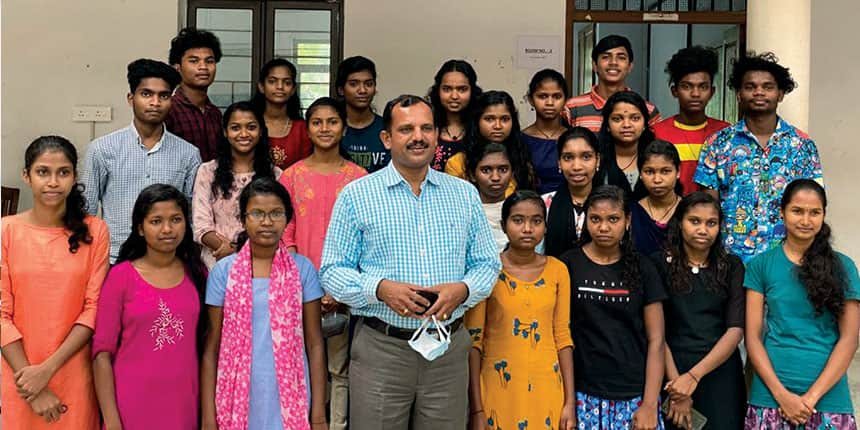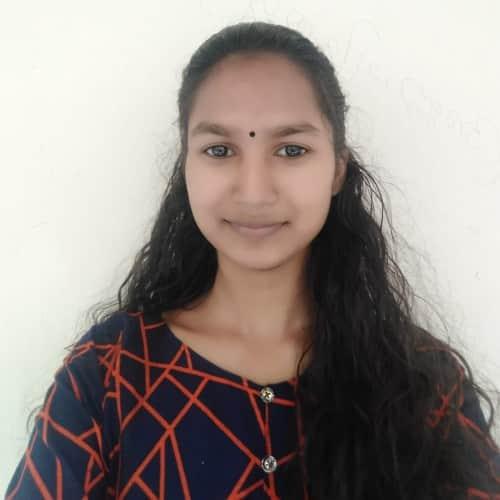Kerala’s free CLAT prep initiative helps Adivasi students reach NUALS, Kochi
R. Radhika | January 12, 2022 | 12:12 PM IST | 7 mins read
A free CLAT coaching programme in Wayanad, Kerala, has placed girls from poor Adivasi families in national and state law colleges
CLAT 2026 College Predictor
Know your admission chances in National Law Universities based on your home state & exam result for All India Category & State Category seats.
Try Now
NEW DELHI: Mridula Manoj, a member of Kattunayakan tribe in the Wayanad district of Kerala was timid and had little hope of a successful career. However, her long-cherished dream of empowering her community now seems achievable. Helped by a coaching programme, she was able to secure admission in the premier National University of Advanced Legal Studies Kochi, this year.
Latest: CLAT 2026 Result Out; Direct Link
New: CLAT 2026 Final Answer Key Out - Download PDF
CLAT 2026 Tools: College Predictor | Rank Predictor
CLAT 2026: Opening and Closing Ranks | Expected Cutoff | Marks vs Rank
While the last two years have disproportionately impacted Adivasi and other marginalised students’ access to education, a silver lining was created by an initiative started by the District Legal Service Authority, Wayanad and Integrated Tribal Development Programme (ITDP). Together, they offer free Common Law Admission Test (CLAT) coaching to the tribal students. The CLAT 2022 will be conducted for admission to the top law schools, the National Law Universities, in India.
The Kattunayakan tribe spread sparsely in remote hamlets of Wayanad, seldom finds academic opportunities. With help of the DLSA initiative, students like Manoj are able to pursue a career in law.
Their representation in the legal sector is close to nil, says K Rajesh, Sub-Judge, DLSA Wayanad. “We want to encourage young students to learn about their rights and also find lucrative careers in law. One of the schemes of DLSA is to uplift the Scheduled Castes and Scheduled Tribes. After a long time of assessment, we found that there are very few lawyers from this community. So, we decided to give them training so they can write law entrance tests. It is essential that the tribal students are given ample opportunities just like other children,” said Rajesh.
Also Read| Implement 27% OBC quota in NLUs, put CLAT 2022 on hold: Students' group after NEET verdict
After receiving intense online training from law teachers from institutions across the country and the volunteers of the non-profit organisation Increasing Diversity by Increasing Access to Legal Education (IDIA), Manoj was able to secure the first rank in the Scheduled Tribe category in Kerala. A daughter of a daily wage-earning mother, Manoj is resolute about pulling her family of four out of poverty. “I want to be able to help my community in some way. I don’t know how yet but I will,” said Manoj with determination.
 Mridula Manoj got admission to NUALS, Kochi in 2021
Mridula Manoj got admission to NUALS, Kochi in 2021
CLAT exam 2022 coaching
The initiative, Niyama Gothra Padhathi, which started in 2020 with only 11 Class 12 students at the peak of the COVID-19 pandemic, was able to attract 27 students this year. They attended a formal orientation and career guidance by the DLSA before being provided with an exam-oriented crash coaching for three months to crack law entrance tests. During the second wave of COVID-19, when the schools were shut down to curb the spread of the virus, the ITDP and DLSA brought these students to model residential schools so that they could attend online lectures.
“The village does not have electricity in the late hours, there is no internet connection nor do they have smartphones to access online classes. DLSA had to bring them into their residential school campus during the peak of the second wave in May 2021. Once they were back on campus, we were able to conduct classes in a much better manner by July,” said Krishnavarna CS, a fourth-year student at NUALS Kochi and a volunteer with IDIA.
Apart from Krishnavarna, 12 other volunteers from the university, who could manage to teach in Malayalam, collaborated with DLSA. “Starting out we were apprehensive about students’ ability to grasp the competitive exam elements. These students study in Malayalam-medium and are not fluent in English. It was quite difficult to teach them in English when the entrance test was conducted only in the English language,” she said.
Also Read| BCI will consider holding CLAT in regional languages, law ministry tells Rajya Sabha
CLAT is conducted throughout India in English-medium and most questions are based on comprehension. The students, Krishnavarna said, were given rigorous training to solve questions in English. So far, the initiative has helped two students from the community get admission to NUALS Kochi. Radhika KK, another student from the community, got admission in 2020, inspiring others to join. Even though only Manoj was able to get admission to a national university this year, seven other students, who had appeared for Kerala Law Entrance Exam (KLEE) as well, got admission in various private and government law colleges.
“Considering the background they come from and the dearth of facilities they face every day, the success of Mridula was very uplifting. If not the national university, several others have successfully got admission in state law colleges which is encouraging,” said Krishnavarna.
CLAT exam 2022: Motivating students
Teachers from the Central University, Kasaragod; Lloyd Law College, Noida; Government Law College, Kozhikode and even a PhD scholar from Yale University in the United States trained the children through videoconferencing. KI Jayasankar, a teacher in the Department of Law, Central University of Kerala, Thiruvalla Campus, supervised the programme. The teachers gave training for English languages, logical reasoning, personality development and other aspects of cracking law entrance tests to these students.
“I belong to Wayanad and I know about the tribes very closely. I feel very connected to the project and never felt it like a burden. When Mr Rajesh invited me to contribute, I was delighted to be able to help the community. Most of the teachers have some connection with the place,” said Lawwellman P, a teacher at Government Law College, Kozhikode.
Also Read| AILET 2022 registration to start from January 17; Application process, eligibility, fees
Even though the students took initiative, it took special efforts to keep them motivated, especially the girl students, said Lawwellman. “A majority of these students were girls. Parents are reluctant to send their girl children away to pursue higher education. We had to speak to the students and their parents throughout to keep them motivated to continue the classes. I was able to visit the children often, if not regularly, to keep them motivated,” he said.
With limited knowledge of their rights and the significance of law education, the students and parents were given counselling to help them see the benefits. “It took some time to allay their fears but it was thoroughly satisfying when they were all on board,” he added.
Studying in government law college
Under the initiative, students who secured admission to law colleges were also provided with laptops and an internet connection. The entire tuition fee of these students is sponsored by the ITDP. The DLSA keeps in touch with the students and helps them get an internship while pursuing their degrees.
While the ITDP and DLSA help students to get through the admission barrier, IDIA extends help to the students on campus. The cost of living, travel and other expenses are covered by the IDIA for Manoj and Radhika and who were both parts of the DLSA initiative.
“At NUALS Kochi we run a scholar development programme on campus. Students coming from tribal areas require help even after they get admission. The campus is intimidating, classes are held in English and the course work is daunting. Senior students on campus act as mentors to the students to help them overcome these hurdles,” said Shinto Mathews Abraham, an alumnus of NUALS Kochi and assistant director at IDIA.
After her admission to the university, Manoj has been regularly attending English coaching offered by the IDIA members. “When I first came to the campus, it was a bit difficult to follow the classroom lessons. Everything is taught in English more or less. I take English classes every day from the mentors which helps me understand lectures better,” said Manoj.
“It was an experiment which has been successful beyond expectation. We plan to continue the programme to help more students join national and state-level colleges. I am hopeful that even more students will join the coaching. To reach more students and increase the success rate we are planning to conduct offline classes this time. Mridula and Radhika will be asked to mentor the students from the community to pursue higher studies in law,” Rajesh said. The Consortium of National Law Universities (NLUs) announced CLAT 2022 exam date on January 1. CLAT exam 2022 will be conducted on May 8, 2022.
The Kerala Legal Service Authority, inspired by the Wayanad initiative, has asked all other districts to emulate the programme in their areas. The inauguration of the third chapter of this initiative was done in December by the Kerala SC and ST welfare minister K Radhakrishnan.
Follow us for the latest education news on colleges and universities, admission, courses, exams, research, education policies, study abroad and more..
To get in touch, write to us at news@careers360.com.